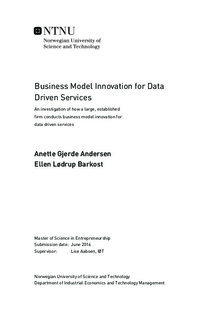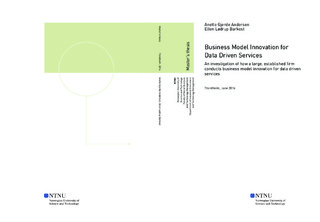| dc.description.abstract | Business model innovation has been identified as vital for sustaining company performance (Zott et al., 2011). Established firms need to renew their business models in the face of changes that potentially threaten company profits (Sosna et al., 2010), as well as business model innovation is necessary to obtain the potential business value from technological innovations (Chesbrough, 2010; Teece, 2010). Despite this emphasis on the importance of innovating business models, there are few studies that focus on understanding the development of business models (Palo & Tähtinen, 2013). Moreover, due to the development towards service-based economies enabled by technology (Chesbrough, 2010), there is a need for studies focusing on how to create and capture value from data (Wamba et al., 2015).
In light of these issues highlighted by scholars, the purpose of this thesis is to investigate how large, established firms conduct business model innovation for data driven services. To fulfill the purpose, the authors investigate business model innovation through activities that define and shape business model components, which is examined through research question 1. Moreover, the thesis studies how the dimensions leadership, network relations and customer involvement impact the process of developing a business model for a data driven service, which is examined through research question 2. Studying these dimensions are motivated by scholars within business model innovation (e.g. Teece, 2010), Big Data (e.g. McAfee & Brynjolfsson, 2012) and the service literature (e.g. Spohrer & Maglio, 2008).
The theoretical background of this thesis builds upon the authors pre-diploma thesis (Andersen & Barkost, 2015) which, based on a literature review, created a theoretical framework for business model innovation in the context of data driven services. This theoretical framework was extended by investigating theory on leadership, network relations and customer involvement in the context of business model innovation, in this thesis. A single-embedded case study design investigating three data driven initiatives at a Norwegian-German classification society, DNV-GL, forms the basis for the analysis and discussion. The empirical findings for the thesis consists of 23 semi-structured interviews with employees from the case company, 13 of which were conducted by the authors, in addition to secondary data consisting of 10 interviews from a previous master thesis investigating one of the initiatives in this thesis (Stabursvik, 2014).
Guided by the theoretical framework, the authors selected and compiled the distilled material from the empirical findings into events in time for each project. These events are analyzed separately for identification of activities and dimensions impacting the development of each service s business model. Also, the project s events are analyzed in terms of how these dimensions interrelated with one another. Finally, a cross case analysis is conducted across the three projects, addressing the research questions. It is found that business model innovation may be viewed as an activity system within events that occur in the development of an initiative. These events shape one or more business model components. Further, the analysis shows how the activity system may be affected by leadership, network relations and customer involvement, either directly in the event, or indirectly through the organizational context, as well as how these dimensions may impact one another.
The discussion combines the findings on research question 1 and 2 into a process perspective consisting of phases, in addition to the considerations of business model innovation in the context of a data driven service and in a large, established firm, in order to answer the purpose. A model of the identified business model innovation process is presented in the discussion. It shows that the process of business model innovation can be viewed as a stream of relatively unrelated events consisting of one or more activities, wherein one event shapes one or more business model components. These events are scattered along the development, or change process of a data driven service, which proceeds through four phases in developing its business model. One event may impact one or more subsequent events in the BMI process, or the definition of a component can influence the definition of other business model components. The dimensions were found to primarily impact an event directly by performing or guiding business model innovation activities in that event, or the dimensions could influence an event indirectly through the organizational context.
This thesis contributes to the business model innovation literature by detailing which activities can be performed during the events of developing or altering a service, that shapes its business model. It further details how this can be done, and potentially is affected by the dimensions, leadership, network relations and customer involvement, with the associated organizational context. Consequently, the thesis extends theory by proposing a model where all of this is incorporated, illustrating the coherence between elements of the overall business model innovation process through an activity-based perspective. This has not been found to be done in existing theory on business model innovation. Furthermore, this thesis describes how a business model innovation process can be analyzed. This provides insights to the gap identified by amongst others Palo & Tähtinen (2013), that there are few studies that focus on the development of business models (Sosna et al., 2010; Seidenstricker et al., 2014).
The practical implications of this research is mainly relevant for management in large, established firms, but could also be interesting for other types of roles and companies, and those looking to leverage data in offerings. The proposed model can be used to generate lessons by analyzing the development of previous initiatives, eliciting the consequences on the business model of choices and actions that have been made. Management s role in initiation of the process and institutionalization of the business model has been crystallized from the analysis as crucial for the initiative s access to resources, ability to explore business model options and for overcoming barriers in the process. For digitizing companies looking to create value through brokering information, four lessons are that the value proposition may be based on creating transparency and/or incorporating multiple data sources, choice of technology may pose significant consequences for the value chain and/or value proposition, and that data access may be an issue when relying on partnerships. | |

